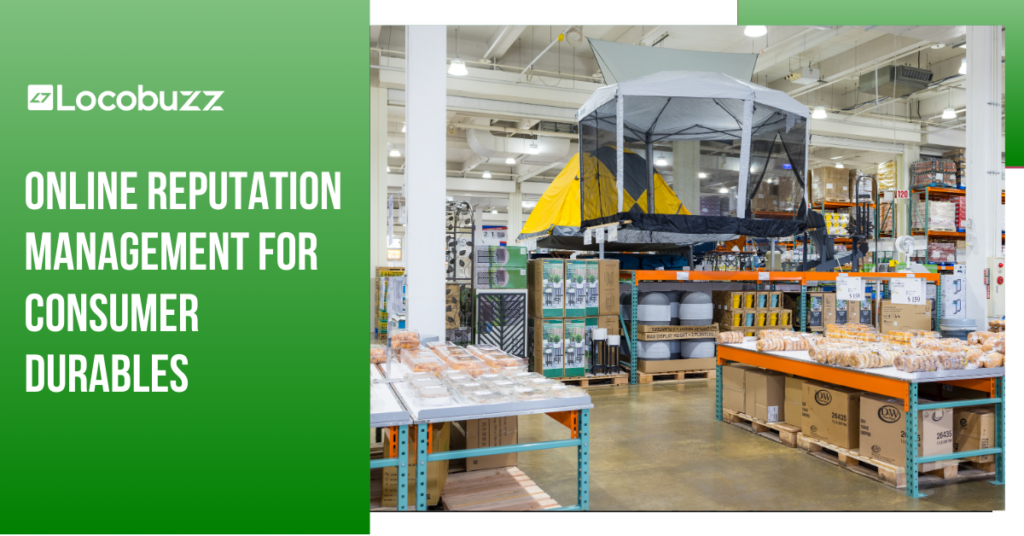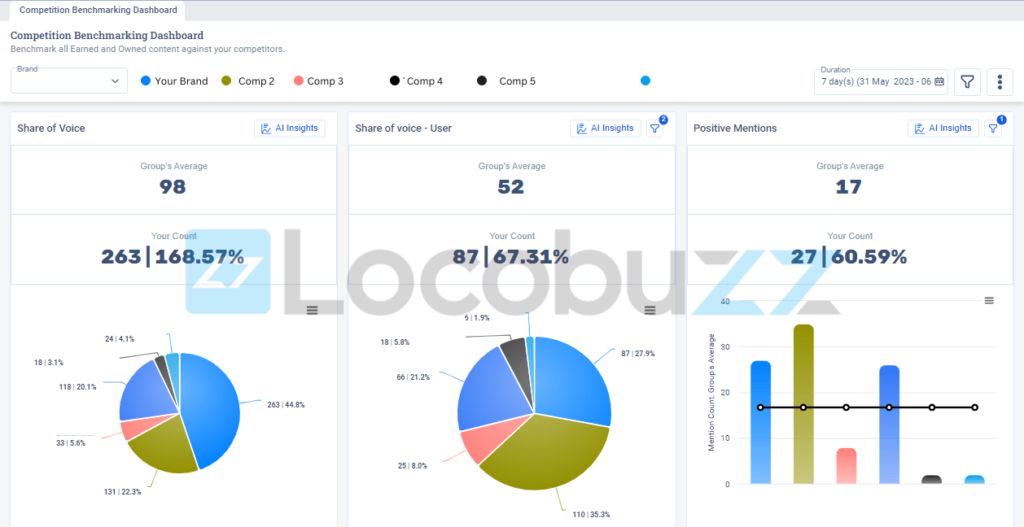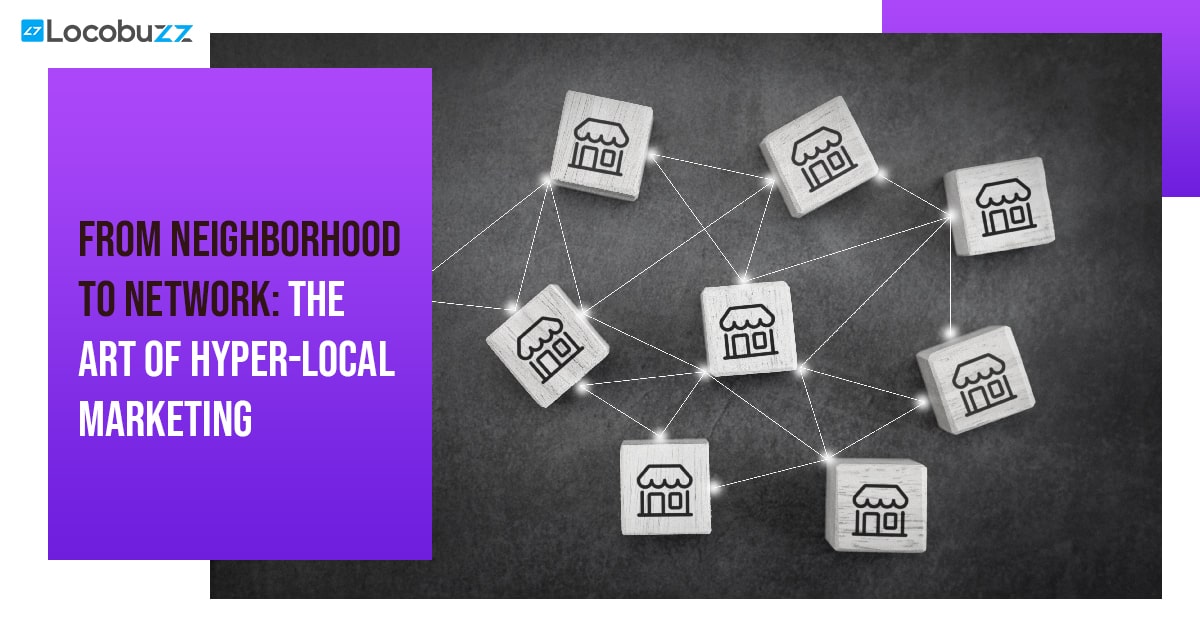Online reputation management for Consumer Durables

Spanning from electronics to household essentials, the way brands interact with consumers has evolved significantly. With the increasing reliance on online platforms for product research and decision-making, the management of online reputation has become paramount.
Online Reputation Management (ORM) for customer durables strategies are essential for shaping how consumers perceive brands in the online sphere, influencing factors such as trust and credibility. By exploring how ORM enables brands to effectively navigate the online landscape, maintain competitiveness, and adapt to the changing preferences of contemporary consumers, brands can grasp its pivotal role in determining the success of consumer durables businesses.
What is Online Reputation Management for Consumer Durables
Online Reputation Management (ORM) for consumer durables is the strategic process of overseeing, influencing, and controlling how brands and products in the consumer durables sector are perceived online. In other words, online reputation management (ORM) for consumer durables is a comprehensive approach to shaping and maintaining the public perception of brands and products within the consumer durables industry on digital platforms.
Challenges Faced Due to ORM Absence in Consumer Durables
Decreased Sales Performance
When a consumer durables brand has a negative online reputation, it can directly impact their sales performance. Consumers today heavily rely on online platforms to research products before making a purchase decision. If a brand’s online presence is plagued with negative reviews, complaints, or unfavorable publicity, potential customers may become hesitant to buy from that brand.
Instead, they are more likely to opt for competitors who have a more positive online reputation and better credibility. Negative online sentiment can create doubt and uncertainty in the minds of consumers regarding the quality, reliability, or customer service of the brand’s products. As a result, even if a consumer initially considers purchasing from the brand, they may ultimately choose to go with a competitor they perceive as more trustworthy and reputable.
Competitive Disadvantage
When brands in the consumer durables sector neglect Online Reputation Management (ORM), they risk falling behind competitors and facing a competitive disadvantage. ORM serves as a tool for shaping how a brand is perceived online, allowing companies to showcase their strengths and unique selling points. Without ORM, brands may struggle to effectively communicate their value proposition and differentiate themselves from competitors in the crowded marketplace.
Competitors who actively manage their online reputation can leverage positive reviews, endorsements, and engaging content to capture consumer attention and build trust. Meanwhile, brands without ORM may fail to highlight their strengths or address misconceptions, causing them to fade into the background as consumers gravitate towards more visible and reputable competitors. Furthermore, in the absence of ORM, brands may miss out on opportunities to engage with customers, address concerns, and provide exceptional customer experiences.
Loss of Credibility and Trust
When consumer durables brands neglect Online Reputation Management (ORM), they risk losing the trust and credibility of their customers. ORM involves actively monitoring and engaging with customers on online platforms to address their concerns and feedback publicly. Without ORM, brands may fail to respond promptly or effectively to customer inquiries, complaints, or issues raised online.
As a result, customers may perceive the brand as unresponsive, uncaring, or indifferent to their needs. This lack of transparency and communication can erode trust and confidence in the brand, leading customers to question its reliability and integrity. In the absence of public responses to customer concerns, negative sentiment may escalate, further damaging the brand’s reputation and credibility. In contrast, brands that prioritize ORM demonstrate their commitment to customer satisfaction and transparency.
By publicly addressing customer concerns and resolving issues in a timely manner, these brands build trust and strengthen relationships with their customers. This proactive approach not only mitigates potential damage to the brand’s reputation but also fosters loyalty and advocacy among satisfied customers.
Why is Online Reputation Management important for customer durables
Impact on Offline Purchases
The impact of online reputation on offline purchases is profound. Before heading out to a store, most consumers now conduct extensive research online. They read product reviews, compare features and prices, watch demonstration videos, and seek advice from experts and fellow consumers on social media and forums. During this online research phase, consumers form opinions about different brands and products based on the information they gather.
A strong online reputation, characterized by positive reviews, favorable comments, and a visible presence on trusted websites and social media platforms, can significantly influence how consumers perceive a brand and its products.
A positive perception can instill trust and confidence in the brand, making the consumer more inclined to choose its products when they visit a physical store. Conversely, if a brand has a poor online reputation, with negative reviews, complaints about product quality or customer service, and minimal engagement on social media, consumers may be hesitant to consider its products, even if they see them in stores.
Competitive Market
In a competitive consumer durables market, where numerous brands compete for consumer attention, establishing a strong online reputation is paramount. With so many options available, consumers often turn to the internet to inform their purchasing decisions. A brand’s online reputation can serve as a powerful differentiator amidst the sea of competitors.
Positive reviews, endorsements from satisfied customers, and engaging social media presence can set a brand apart and capture the attention of potential buyers. In a crowded marketplace, where products may seem similar in terms of features and pricing, a strong online reputation becomes a key factor influencing consumer choice.
Brands with a positive online presence are more likely to gain trust and credibility, making them the preferred choice for discerning consumers. By standing out, a brand can effectively attract more customers and increase market share. A robust online reputation not only helps in acquiring new customers but also in retaining existing ones, as satisfied customers become brand advocates and loyal supporters.
Purchase Cycle
Consumer durables typically involve a longer purchase cycle compared to other products. Unlike impulse buys, consumers often spend weeks or even months researching, comparing options, and weighing their decisions before making a purchase. This prolonged decision-making process underscores the importance of maintaining a positive online reputation throughout the entire journey.
During this extended period, consumers engage in thorough research, scouring the internet for product information, reviews, and recommendations. A brand’s online reputation plays a crucial role in keeping consumers engaged and interested throughout this process. Positive reviews, testimonials, and a strong social media presence can help reinforce the brand’s credibility and desirability, keeping it top of mind as consumers evaluate their options. Additionally, consumers may revisit their research multiple times, seeking reassurance and validation before finalizing their decision.
A consistent and positive online reputation ensures that the brand remains favorable and trustworthy throughout these touchpoints, increasing the likelihood of conversion. Furthermore, as consumers progress through the purchase cycle, they may encounter competitors and alternative options. A strong online reputation can serve as a competitive advantage, helping the brand stand out amidst the competition and maintain consumers’ interest and loyalty.
Effects of Negative Publicity
Negative publicity or reviews can be detrimental to consumer durables brands, with the potential to cause a range of adverse effects, including decreased sales, tarnished reputation, and loss of consumer trust. In today’s digital age, where information spreads rapidly across various online platforms, the impact of negative publicity can be swift and far-reaching. Consumers heavily rely on reviews and online content to inform their purchasing decisions, especially when it comes to durable goods requiring substantial investment.
Negative reviews or publicity can dissuade potential customers from considering the brand’s products, leading to a decline in sales and revenue. Moreover, negative publicity can damage the brand’s reputation, eroding the trust and loyalty of existing customers. Consumers may associate the brand with poor quality, unreliability, or unethical practices based on negative publicity, resulting in long-term damage to brand equity. Effective Online Reputation Management (ORM) is essential for consumer durables brands to mitigate the impact of negative publicity. By promptly addressing and resolving issues raised in negative reviews or publicity, brands can demonstrate their commitment to customer satisfaction and transparent communication.
Engaging with dissatisfied customers publicly and offering solutions or compensation can help turn negative experiences into positive outcomes, showcasing the brand’s responsiveness and dedication to customer care. Additionally, brands can utilize ORM strategies to amplify positive content and counteract the effects of negative publicity, thereby preserving and enhancing their brand image.
Expensive purchases
Before committing to such purchases, consumers undertake thorough research online, meticulously examining product details, reading reviews, and seeking advice from others. In this process, a brand’s positive online reputation plays a pivotal role in shaping consumer perceptions and decisions. Given the substantial financial investment associated with consumer durables, consumers are inherently cautious and discerning in their decision-making.
They rely heavily on the opinions and experiences of others, often turning to online platforms to gather information and insights. A brand with a positive online reputation, characterized by glowing reviews, endorsements, and a strong presence on reputable websites and social media channels, instills trust and confidence in potential buyers.
Consumers are more inclined to choose products from brands with a proven track record of customer satisfaction and reliability, as reflected in their online reputation. Positive feedback and endorsements from other consumers serve as social proof of a brand’s credibility and quality, influencing purchase decisions in a favorable direction.
A positive online reputation acts as a valuable asset for consumer durables brands that builds trust and confidence among consumers during the high-involvement purchase process.
By building a strong online presence and cultivating positive relationships with customers, brands can effectively sway purchase decisions in their favor and establish long-term loyalty among discerning consumers.
Discover how Locobuzz's ORM capabilities are transforming consumer durable brands.
The Key Components of ORM for Customer Durables
Listening and Monitoring
In this process, brands actively utilize a spectrum of tools and technologies to track and analyze mentions, reviews, and discussions pertaining to their brand and products across diverse online platforms. These platforms span social media networks like Twitter, Facebook, and Instagram, alongside consumer review sites, forums, and news articles. By employing specialized monitoring tools, brands can efficiently gather and assess data from these sources, gaining invaluable insights into consumer sentiment and perception.
On social media platforms, brands keep a vigilant eye on hashtags, mentions, and comments to understand customer sentiments in real-time. This enables them to identify emerging trends, engage with customers, and address concerns promptly. Similarly, they monitor consumer reviews on e-commerce websites and dedicated review platforms, aiming to address feedback, resolve complaints, and maintain positive brand perception.
Incorporating tools like Locobuzz into their arsenal further amplifies their capabilities. Locobuzz is a comprehensive customer experience and digital engagement platform that leverages AI and machine learning to offer deep insights into customer behavior, sentiment analysis, and brand health. It not only aggregates data from a wide array of digital platforms, including social media, review sites, and forums, but also provides actionable analytics, helping brands to understand the nuances of customer conversations and sentiments across the digital landscape.
Customer Relationship Management (CRM)
By leveraging CRM software, the brand can effectively track and manage customer interactions and feedback throughout the customer lifecycle. Following a customer’s purchase of a home entertainment system, the brand utilizes CRM software to record and organize key information, such as purchase history, communication preferences, and any feedback provided by the customer.
This enables the brand to maintain a comprehensive overview of each customer’s journey and tailor future interactions accordingly. Post-purchase, the brand initiates proactive follow-up communication with customers to ensure satisfaction and address any concerns or issues that may arise. This may involve sending personalized emails or making follow-up calls to gather feedback on the product’s performance and the overall purchase experience.
By actively engaging with customers post-purchase, the brand demonstrates its commitment to customer satisfaction and establishes a direct line of communication for addressing any issues promptly. Additionally, gathering feedback through CRM allows the brand to gain valuable insights into areas for improvement, product enhancements, and customer preferences. CRM serves as a valuable tool for the home entertainment system brand to nurture customer relationships, enhance satisfaction, and gather actionable insights for continuous product improvement, thereby contributing to the brand’s overall ORM efforts.
Locobuzz enhances CRM strategies with its easy, no-code integration into existing CRM systems, offering brands a streamlined approach to customer relationship management. Its platform automates the synchronization of customer data and interactions from various channels, enabling a unified and personalized customer experience.
With features like real-time analytics, automated responses, and sentiment analysis, Locobuzz provides actionable insights for effective feedback management and customer engagement. This integration allows for a more responsive and tailored approach to customer service, significantly boosting a brand’s ability to nurture customer relationships, improve products, and enhance overall satisfaction without the need for technical expertise.
Competitors Analysis

By closely monitoring competitors’ online reputations, the brand gains valuable insights into their strengths, weaknesses, and overall market positioning. Through thorough examination of competitors’ reviews, social media presence, and customer feedback, the vacuum cleaner brand identifies areas where competitors excel and areas where they fall short. This analysis provides the brand with a deeper understanding of consumer preferences, pain points, and unmet needs within the market.
Armed with this knowledge, the vacuum cleaner brand can strategically differentiate its products by emphasizing unique features or addressing common pain points highlighted in competitor reviews. For example, if competitors receive complaints about noisy operation or ineffective suction power, the brand may emphasize its vacuum cleaners’ quiet operation and powerful suction capabilities in its marketing messaging. Furthermore, the brand can use competitor analysis to identify opportunities for innovation and product development.
By recognizing areas where competitors are lacking or where consumer demand remains unmet, the brand can tailor its product offerings to better align with market needs and preferences.
Locobuzz enables businesses to track competitors’ online activities, customer sentiment, and market trends across multiple channels, including social media, forums, and review sites. This capability allows for real-time insights into competitors’ strategies, customer engagement techniques, and product feedback.
Brands can compare their performance against competitors on various metrics like customer engagement, sentiment, and digital presence. This helps in identifying strengths and areas for improvement.y examining the content strategies of competitors, brands can understand what type of content generates engagement and resonance among the target audience, informing their own content strategies.
Search Engine Optimization (SEO)
By optimizing their website content and product pages with relevant keywords, the brand aims to improve its visibility and ranking in search engine results, thereby increasing organic traffic and attracting potential customers. To achieve this, the brand conducts keyword research to identify terms and phrases that are commonly searched for by its target audience.
These keywords are strategically incorporated into website content, including product descriptions, blog posts, and landing pages, to ensure that the brand’s website ranks higher in search engine results pages (SERPs) for relevant queries. In addition to on-page optimization, the brand also focuses on off-page SEO tactics, such as link building and online reputation management. By encouraging satisfied customers to leave positive reviews on review sites and other third-party platforms, the brand not only enhances its online reputation but also boosts its credibility and authority in the eyes of search engines.
Positive reviews serve as valuable social proof of the brand’s quality and reliability, influencing potential customers’ purchasing decisions and further improving the brand’s visibility and reputation online. Additionally, positive reviews can lead to increased click-through rates and conversions, as users are more likely to trust and engage with brands that have a strong online reputation.
Content Creation
Conclusion
As consumers increasingly rely on digital platforms to inform their purchasing decisions, the significance of cultivating a positive online reputation cannot be overstated. From monitoring and engaging with customers to leveraging content creation and strategic promotion, Online Reputation Management for customer durables encompasses a multifaceted approach aimed at nurturing brand trust, enhancing visibility, and fostering lasting relationships with consumers.
For brands operating in the customer durables sector, ORM transcends mere reputation management; it serves as a strategic imperative, offering a pathway to differentiation, solutions against negative publicity, and sustained growth in a fiercely competitive market. By actively managing their online reputation, brands can build trust, credibility, and loyalty, ultimately positioning themselves for sustained success.






















